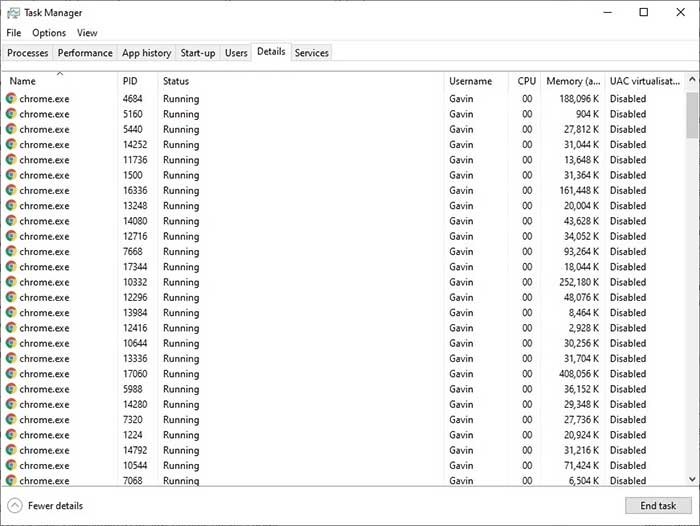Does Chrome browser really consume RAM?
Chrome has always been notorious for "consuming RAM" on computers . However, the truth is that sometimes other web browsers use more RAM than Chrome.
There are many web browsers for users to choose from. Among them, Chrome is the most prominent name. According to Statcounter statistics in January 2023, this software accounts for more than 66% of the computer browser market share.
Every user wants a laptop with long battery life. Meanwhile, Chrome is famous for consuming a lot of RAM and draining the battery quickly.
The proof is that when you turn on Task Manager, you will often see Chrome at the top of the list using the most RAM on your computer.
Is Chrome really the most "RAM consuming" browser?
A few years ago, the answer would have been yes . Google Chrome's reputation for consuming RAM has also become known to many people since then.
However, Google later improved Chrome's memory usage, especially compared to other popular browsers.

Google Chrome's reputation for consuming RAM has been around for several years. (Photo: MakeUseOf).
Sometimes, other popular web browsers like Mozilla Firefox, Microsoft Edge, Opera or Safari even use more RAM than Chrome.
For testing, MakeUseOf tried opening tabs including Facebook, YouTube videos, BBC website and social network X in 5 browsers.
As a result, Google Chrome only ranked 3rd in terms of RAM resources consumed, after Safari and Mozilla Firefox.
To understand why Chrome uses so much memory, let's understand how most modern browsers work.
Every application on your computer runs processes in computer RAM. RAM is temporary storage for all types of data and has the biggest advantage of being very fast access speed.
Compared to a hard drive or even an SSD, a CPU can access data stored in system RAM much faster.
Chrome, Firefox, Opera, and Microsoft Edge store all tabs, plugins, and extensions in different RAM processes. This process is called isolation and prevents processes from overwriting each other.
Therefore, the more tabs you open, the more RAM Chrome will use. This explains why when opening Task Manager, users will see many Chrome applications running at the same time.

Statistics on RAM consumption of popular browsers today. (Photo: MakeUseOf).
Browsers like Chrome manage RAM this way to provide stability and faster access speeds.
The main reason to run each process separately lies in stability . By running each process separately, the entire browser remains stable if one process crashes.
Sometimes, a plugin or extension will crash and require the user to refresh the tab.
If every tab and extension is run in the same process, you may have to restart the entire browser instead of just working on a single tab.
The browser is not the cause
In fact, how much RAM Chrome needs or its limitation lies in the user system hardware itself.

Illustrates how the Chrome browser uses RAM on the computer. (Photo: MakeUseOf).
Just because Chrome uses a lot of RAM doesn't mean it will cause problems. On the contrary, there is no benefit to your computer not using available RAM.
The operating system inherently only uses RAM to access data quickly and increase processing speed. Therefore, if you keep more RAM empty, it means you are not taking advantage of the true power of your computer.
Just like on smartphones, clearing running processes and RAM can slow things down in the long run.
That's why RAM cleaners and boosters are not good for your phone, because by its nature RAM is designed to be filled with data.
However, if Chrome uses too much memory it can become a problem.
When the browser uses too much memory, it limits the amount of space available to other programs.
Chrome may even start having difficulty making important information available from your browser for quick access, thereby disallowing RAM usage.

Since version 89 Chrome has supported PartitionAlloc technology to help optimize and "consume" less RAM when used. (Photo: 9to5Google).
Since late 2020, Google Chrome developers have announced a RAM-saving feature for the browser called PartitionAlloc Fast Malloc.
Without going into the technicalities of the feature, this feature will simply stop any single process consuming more than 10% of total system memory.
By March 2021, with the release of Chrome 89, PartionAlloc went live. Google claims that this feature reduces memory usage on 64-bit Windows operating systems by more than 20% and reduces it by an additional 8%.
As a result, the current version of Chrome you may be using removes old memory faster, reduces RAM consumption, and no longer has a "memory-hungry" reputation.
- The most annoying thing about Chrome browser is about to be fixed
- How to make Google Chrome browser run much faster
- How has the world transferred from IE to Chrome?
- Google officially developed Chrome OS that supports x86 / ARM
- Google campaign for Chrome
- Don't trust Chrome's Incognito mode
- Instructions for syncing Chrome data on multiple devices
- Why when losing Google Chrome network for users to play dinosaur games?
- What happens if you open 100 Chrome tabs on your phone?
- Chrome extension can detect fake photos up to 99.29% accuracy
- How to change the default browser on Windows 10
- What do you do when your baby gets chrome?
 What is the Snapdragon SiP chip?
What is the Snapdragon SiP chip? How to create a yellow circle around the mouse cursor on Windows
How to create a yellow circle around the mouse cursor on Windows Edit the Boot.ini file in Windows XP
Edit the Boot.ini file in Windows XP 3 ways to restart the remote computer via the Internet
3 ways to restart the remote computer via the Internet